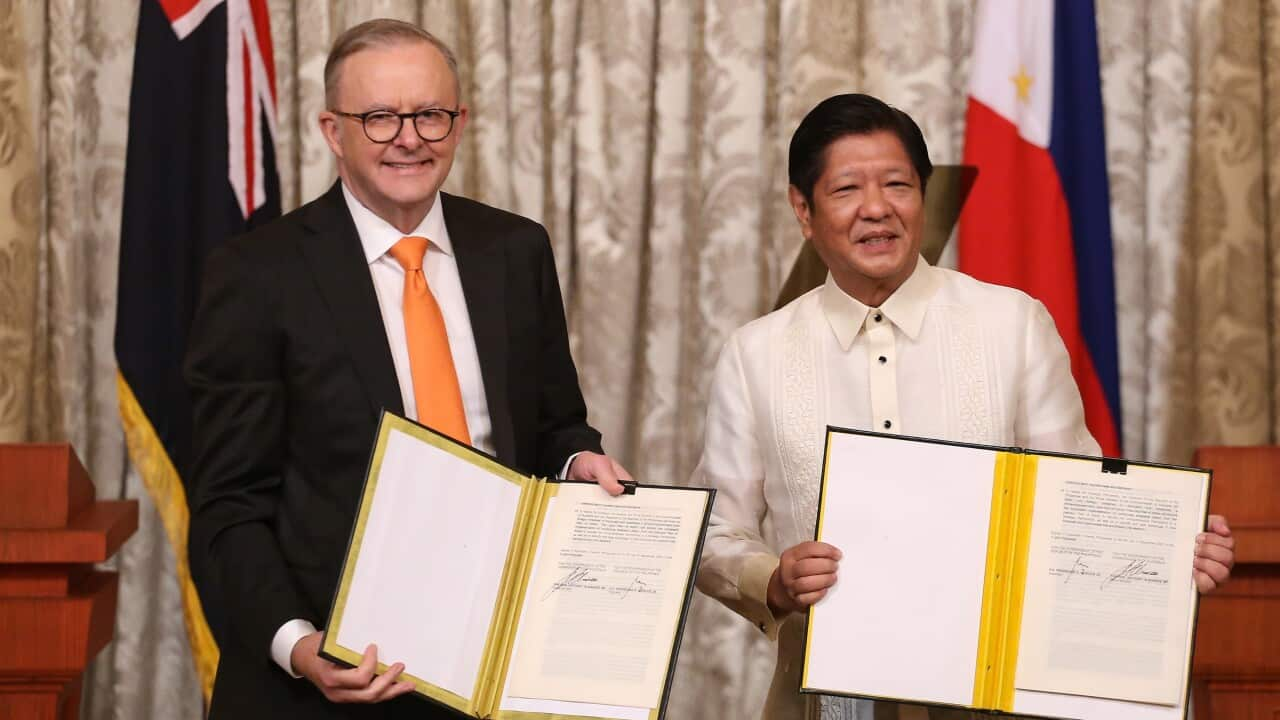TRANSCRIPT
(MUSIC: Waltzing Matilda)
The first bilateral visit by an Australian Prime Minister to the Philippines in two decades included some familiar cultural fusion.
The country was carefully selected for a one-day stopover before the Prime Minister travels to the G20 in New Delhi.
Prime Minister Anthony Albanese has used the visit to Manila to show Australia's backing for the Philippines' territorial rights in the South China Sea, which China claims ownership of through the use of the controversial "nine-dash line" on its maps.
Philippines' President Ferdinand Marcos Junior said at a joint conference that Australia's backing on this issue informs a close relationship between the two nations.
"It is heartening to find that our visions for the future are quite closely aligned and our goals for regional stability and prosperity resonates from this. Both the Prime Minister and I acknowledge that our shared values, the democratic and mutual respect for international law have been instrumental in fostering a strong partnership."
Mr Albanese announced the signing of a new security agreement, including conducting joint patrols in the contested region, which he says will further strengthen bilateral ties.
"Australia is ambitious with what we can achieve with the Philippines and with the region. In that spirit of ambition President Marcos and I had very constructive meeting this morning and of course we've signed our new strategic partnership. This elevation is an important symbol of the strength of our relationship and our shared commitment to do more together."
Australia is home to one of the world’s largest Filipino communities.
Mr Albanese payed his respects at the monument to executed national hero Jose Rizal [[HOSS-AY RISS-AL]], who is also commemorated with parks and statues in Australia.
The Prime Minister was handed the keys to the city, before offering a new working holiday visa deal to encourage more of the 114 million strong Filipino population to help power Australia’s economy.
Mr Albanese also announced increased support to encourage Filipino students to attend Australian institutions.
"Educational and institutional links will continue to play a key role in our bilateral relationship. And I am pleased today to announce that we are doubling the number of Australia Awards Scholarships available to students from the Philippines."
Ferdinand Marcos Junior, known as "Bong Bong", was elected to the Presidency last year after harnessing a groundswell of public support and millions of followers on social media.
He is particularly popular with young voters not yet born when his father, dictator Ferdinand Marcos Senior, still ruled.
With the Prime Minister walking a diplomatic tightrope, the visit underscores just how strategically important the Albanese government believes the Philippines will be.
While on Friday [[8 September]] he visited one of the first countries to endorse the AUKUS deal designed to contain China’s strategic power, on Thursday [[7 September]] he confirmed a visit to meet President Xi in China later this year.
President Marcos praised the Albanese government's support for a 2016 decision from the International Court of Justice in favour of the Philippines, which dismissed China's claim to much of the South China Sea.
“A word of thanks to you Mr Prime Minister for the strong support that you have made for the Philippines, especially during the past ASEAN conference where you have made very clear that the claims that are being made upon our Philippine maritime territory, are not valid and have not been recognised, and are not in conjunction, are not consistent with international law."
Mr Albanese stressed that the Australia's support for the decision and the UN Convention on the Law of the Sea has never changed.
"We have common views about the need to uphold international law and Australia's position on that will continue to be consistent, as we have always been, including recently, over issues relating to the South China Sea."
Under the new strategic partnership, Australia and the Philippines' defence ministers will meet every year.
As the government seeks to redraw its regional strategy in the Indo-Pacific, it must continue to transform acquaintances like the Philippines into trusted allies.













